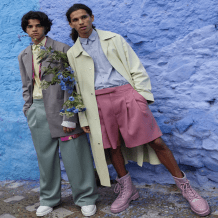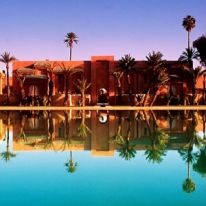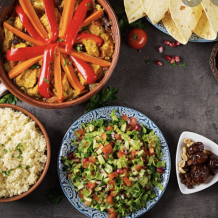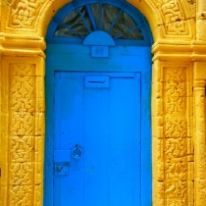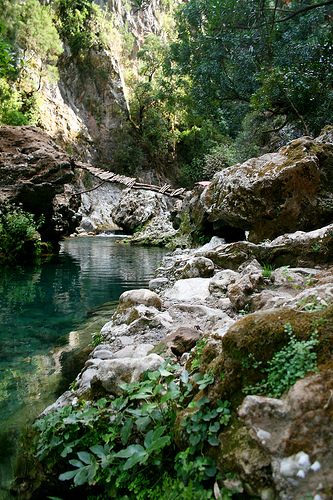
Visiting Morocco offers the opportunity to discover wide open spaces and magnificent desert landscapes, rocky gorges, ancient kasbahs sprawled across a mountain backdrop and bustling historic cities. Morocco is the ideal North African destination that should be on your bucket list. Whether you’re into green living or interested in the ways you can make this world a more sustainable, below are some tips for staying eco friendly on the road–you might be surprised how easy (and bespoke, and luxurious as well) it is to make yourself a traveling friend of the planet in particular when visiting Morocco.
Tips for staying eco-friendly on the road.
• Try a boutique riad, that is eco-conscious, a work stay or eco-lodge instead of a regular 5-star hotel.
•There’s more to being environmentally friendly when you’re traveling abroad then having the maids not clean your room, or reusing your towel for your entire stay (although these are both good things!). If you really want to make a change in the way you travel, there are two really great options that put the carbon emissions of staying in a resort or taking a cruise, and those options are work stays and ecolodges.
•Spending a week in a riad in one of Morocco’s old cities offers the opportunity to know your host, be eco-conscious and have the services along with comfortable amenities needed for your trip, whether it is a private tour or independent travel experience.
•Work stays may be something you associate with a gap year or something students do as a study abroad program, but there are options available for people of all ages, and most of them are tamer than the Peace Corps. Try programs like the ones found on GoEco.org, you could be rehabilitating elephants in Thailand, providing medical assistance in Cambodia, helping out conservation efforts in the Great Barrier Reef or assisting with farms in Berber Villages in Morocco. Now, what sounds cooler than that?
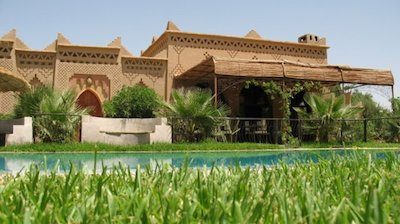
•And ecolodges are no work and all play, just check out L’MaLodge, Les Jardins Des Skoura or in the Skoura Palmerie or Sawadi, a guest house located on an organic farm. The small, sleepy town of Skoura has a big market Souk every Monday and a small group of administrative buildings. Most impressive in Skoura are the many kasbahs that ripple through its dry rocky oasis. Skoura is referred to as the “Valley of One Thousand Kasbahs.” With the Valley of Almonds and Dades Valley nearby there are plenty of one-day excursions from Skoura. The eco-lodges there serve organic cuisine from their gardens which guarantees a farm to table experience and all products used on their premises are bio/ organic.
Frequent places outside the norm.
•New York City, London, Paris, Tokyo, Casablanca are all wonderful, destination hotspot cities, but once you get into them, the places that are really interesting are East End, Montmartre Shimokitazawa and Marrakech. Located in the same places as these hotshot places like Time Square, The London Eye, The Eiffel Tower, Majorelle Gardens and more, it’s the smaller, micro-communities within the big cities where you’ll want to grab a pint, shop for goodies, or book a reservation for dinner.
•It’s not just because these places are outside the tourist bubble (though that’s a really great reason to stay away from them), but it’s because you’re putting money into the communities that support these bigger, larger-than-life tourist city centers and you’re getting a real look at how the people who live there, are actually living their lives. Perspective is pretty green, which leads me to my next point…
Buy only local, handmade gifts. Ditto for food and drink.
•One of the best things about vacationing in Morocco is purchasing something handmade by artisans who live there; the wooden Kokeshi dolls show hundreds of years of folk art technique, Moroccan rugs show hundreds of hours of labor, and handmade leather sandals from Greek trace back before democracy. A shot glass isn’t going to get the same story.
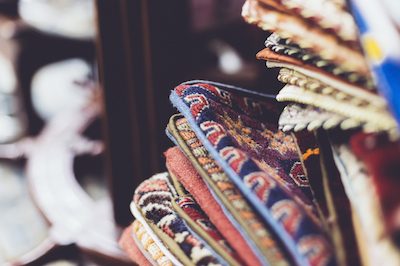
One of the best things about vacationing in Morocco is purchasing something handmade by artisans.
•When you buy cheap trinkets made in other countries and imported for the benefit of tourists, you undercut the local economy, driving down living wages, and making it harder for local producers to keep up. When it comes to tourist gifts, you’re also trading a silly shirt for something that was made with cultural consciousness and care; it’s just a better rule to shop and eat with the locals, it helps sustain their culture and keep your travel destination exactly how it is for years to come.
•And please, for all that is wonderful in the world, don’t buy cheap electronics! Electronics overseas can be malfunctioning, made under terrible working conditions, headed for a giant, unhealthy dump, or are even potentially stolen (if it has an iCloud lock on it, you know it belonged to someone else first) and no one should go on vacation for an Android. Buy food, buy art, buy small doodads but never technology. Save those purchases for the home.
•Travel lighter.
•Seems easy right, to take off the poundage when you’re traveling? Maybe not, but every pound counts, especially when you’re jetting all over the world. One of the best ways to cut down on excess weight is to just pare down to the essentials. Don’t take “what if” accessories, additional clothes for weather that is unlikely to happen; if it’s summer, no need to take a parka, although raingear is always a good idea.
Need help trying to figure out what to leave and what to take? Map out your itinerary, and consider what’s practical for your trip. A couple pair of shoes, interchangeable separates, and at least one nice outfit is a great place to start. If you’re still stumped, go through Travel Exploration’s A-Z packing guide for inspiration.
•Ditch the water bottles.
•There are very few things that everyone considers unanimously bad for the environment as water bottles (carbon emissions is just one of them). From containing dangerous chemicals to taking forever to decompose, water bottles are just about the worst thing that can end up in a landfill or in the ocean, choking the life out of an ecosystem somewhere.
•How do you get away from this while traveling? There’s a couple of options. First, reuse the same water bottle over and over again if you have to; stop buying water in restaurants unless it’s tap (worried about clean water? take a purifying device or tablets along with you). Second, get a good water bottle that you can carry with you wherever your feet might take you. Avex Brazos is a good bet (it’s BPA-free plastic), as are the Hydro Flask Wide-Mouth Vaccum (great for insulation, keeps cold and hot), and the popular, cheap favorite, Naigene.
•Looking for more ways to make an impact around the planet and in Morocco during your visit or are you interested in sharing some of your green tips for traveling abroad? Leave a comment at the end of the article and I’ll try it out in my new travel routine. We’re always looking for better ways to connect with local communities and be a service -so please feel free to share your ideas with Morocco Travel Blog!
Bon voyage vert!
By Claire Lovesti – a self-confessed travel nut, traveling around the world since her mum farewelled her in a teary goodbye. For more information on Claire’s adventures through 48 cities in 26 countries on 4 continents, you can read her blog at Traveltio.com

